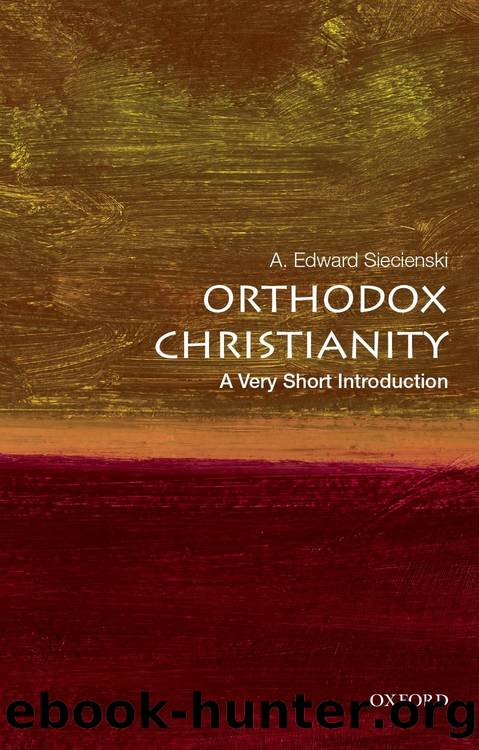Orthodox Christianity: A Very Short Introduction by A. Edward Siecienski

Author:A. Edward Siecienski [Siecienski, A. Edward]
Language: eng
Format: epub
ISBN: 9780190883294
Amazon: 0190883278
Publisher: Oxford University Press
Published: 2019-06-02T23:00:00+00:00
For those familiar with Western Christianity, especially evangelical Protestantism, this description of humanityâs salvation in Christ may seem incomplete. While the West has usually emphasized the salvific death of Christ as payment for sin, using words like âatonementâ or âsatisfaction,â the East has instead stressed the importance of the resurrection in bringing humanity to new life. It is not that the West forgets Easter Sunday or that the East forgets Good Friday, but rather a matter of emphasis. For the Orthodox, when Christ willingly accepts the cross and âhe who hung the Earth upon the waters is hung on the treeâ (Fifteenth Antiphon of Good Friday), death itself is transformed and the terrifying moment of humanityâs end is turned into a victory.
Even with Christâs victory over death, sin remained part of the human condition and had to be overcome via the power of Godâs grace. The issue, as ever, was free will, which instead of working synergistically with God remained distorted by the sinful self-love that separated humanity from Him in the first place. This perversion of the will predisposes people to choose perceived goods (sensual pleasure, avoidance of pain) instead of their ultimate end, which is why humanity finds it so difficult to obey God. Even Jesus, who was God and whose human will was in perfect conformity with that of the Father, was tempted to disobey (as in the Garden of Gethsemane on the night before his death), but never did. Thus what is required of Christians is essentially a retraining or reorientation of the will so that through asceticism (self-discipline), believers can conform their wills to Christâs and thus, like him, always choose what God wants rather than what they personally desire. In the words of Maximus the Confessor, in this process of dying to self another incarnation takes place in the believer whereby Christâs presence âgrows fat by the practice of the virtuesâ and Godâs likeness is once again restored. The Christian dies to sin to the extent that Christ lives within them.
Download
This site does not store any files on its server. We only index and link to content provided by other sites. Please contact the content providers to delete copyright contents if any and email us, we'll remove relevant links or contents immediately.
Jehovah's Witnesses & The Real Truth by winters Joseph(195)
Russian Nuclear Orthodoxy by Dmitry Adamsky;(187)
The Book of Mormon: A Very Short Introduction (Very Short Introductions) by Terryl L. Givens(169)
The Orthodox Faith Volume 3: Church History by Thomas Hopko & David C. Ford(160)
Mormon America - Revised and Updated Edition by Richard Ostling(153)
The Reluctant Apostate: Leaving Jehovah's Witnesses Comes at a Price by Lloyd Evans(152)
Watchtower Jehovah's Witness Teachings Examined (The WOW Self-help Series Of Natural Health Alternatives Book 3) by Knowles Norman(123)
Dialogue With A JW by Mitchell Sean(121)
